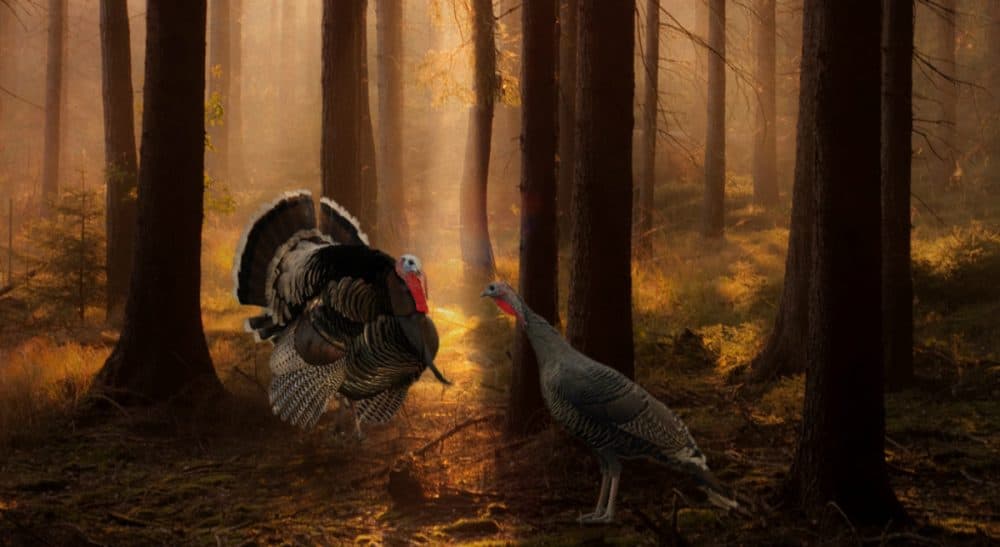Advertisement
Commentary
A Locavore's Dilemma: Meeting The Turkey Before Eating Him

My husband brought Al home wrapped in two garbage bags.
The last time I'd seen him, he was frolicking in a field 14 miles from my house, at Stonecrop Turkeys, munching on clover and pecking at insects. My first reaction to watching the turkeys go about their fowl business was, How clean they look! My second thought: We should all be vegetarians because it’s wrong for these birds to be killed merely for our gastronomical pleasure. My third? I bet these birds are so delicious smeared in gravy. Ah, the locavore's dilemma.
He became our awkward pet, taking up 22 pounds of room in our refrigerator, garbage bags sealing in his juices.
Today, we will be among the 86 percent of Americans who will reportedly gobble turkey. I thought it would be more humane to buy local – that visiting my Thanksgiving dinner in advance of the holiday would make me feel more grateful for its offering and help me better understand where the poultry on my dinner plate fits in the larger picture of the food chain.
I just wasn’t prepared for the guilt.
My husband called him Alfred. My dad called him Harvey. My mom preferred Joe. Why must we have named the beast? He became our awkward pet, taking up 22 pounds of room in our refrigerator, garbage bags sealing in his juices. I'd been angling for a healthy Thanksgiving, with a pasture-raised bird at the center of the meal (he was even fed local, organic grain!), but it began to feel uncomfortable with poor, dead Al in our fridge.
And then the anger kicked in. Have I been brainwashed by Big Poultry? My family recoiled at the idea of eating a bird that had been raised like a pet, but they also wanted to domesticate our dinner by christening it with a name. We can’t eat Al! We named him! We are amateurs. There’s no naming in animal husbandry!
In our bizarre-o world, it’s considered less controversial to buy a vacuum-packed, solution-bloated bird at the supermarket than it is to know where our Thanksgiving turkey really comes from.
“I can never eat anything that looks like it’s ever been alive,” said a co-worker, a meat lover who prefers filets and boneless everything.
I told another acquaintance about our Thanksgiving plans and — namely — that Al is in our fridge. “That’s disgusting,” she said. “I once got a local turkey and the sight of a few leftover feathers was so gross.”
Our food-ways are so backwards that we shudder at the natural state and embrace the processed one. I’m certainly not immune to this dynamic, even as I attempt to fight my way through it. And I get it. When we select our turkey at the supermarket, rather than picking it up from the farm, we can easily disassociate the turkey from its source. We don’t feel complicit in its death because we are simply running errands – grabbing the turkey with nary a glance at it besides eyeballing the price-per-pound, and placing it in the cart along with the onions, the box of stuffing and the gallon of apple cider. It’s a product, not a once-living being.
Thank you, Al, for reminding us that food is personal. I just hope meeting you won't prevent me from relishing your luscious gravy today.
But we bestowed our bird with a name precisely because he isn’t a mass-produced food-thing. The problem is, it’s hard to eat a thing with a name. So my family now acutely feels our place on the food chain. We have just discovered that feeling good about taking responsibility for what we eat doesn’t mean that we don't also feel unjust.
Oh, Al, how you torment us!
But better us than Al. If any one of us saw the conditions that most turkeys are raised in, most would surely pass when the turkey platter came our way. Yet supermarkets make it easy to depersonalize our food by packaging it beyond recognition. I saw Al in his lush pasture. He was postcard-perfect.
Thank you, Al, for reminding us that food is personal. I just hope meeting you won't prevent me from relishing your luscious gravy today.
